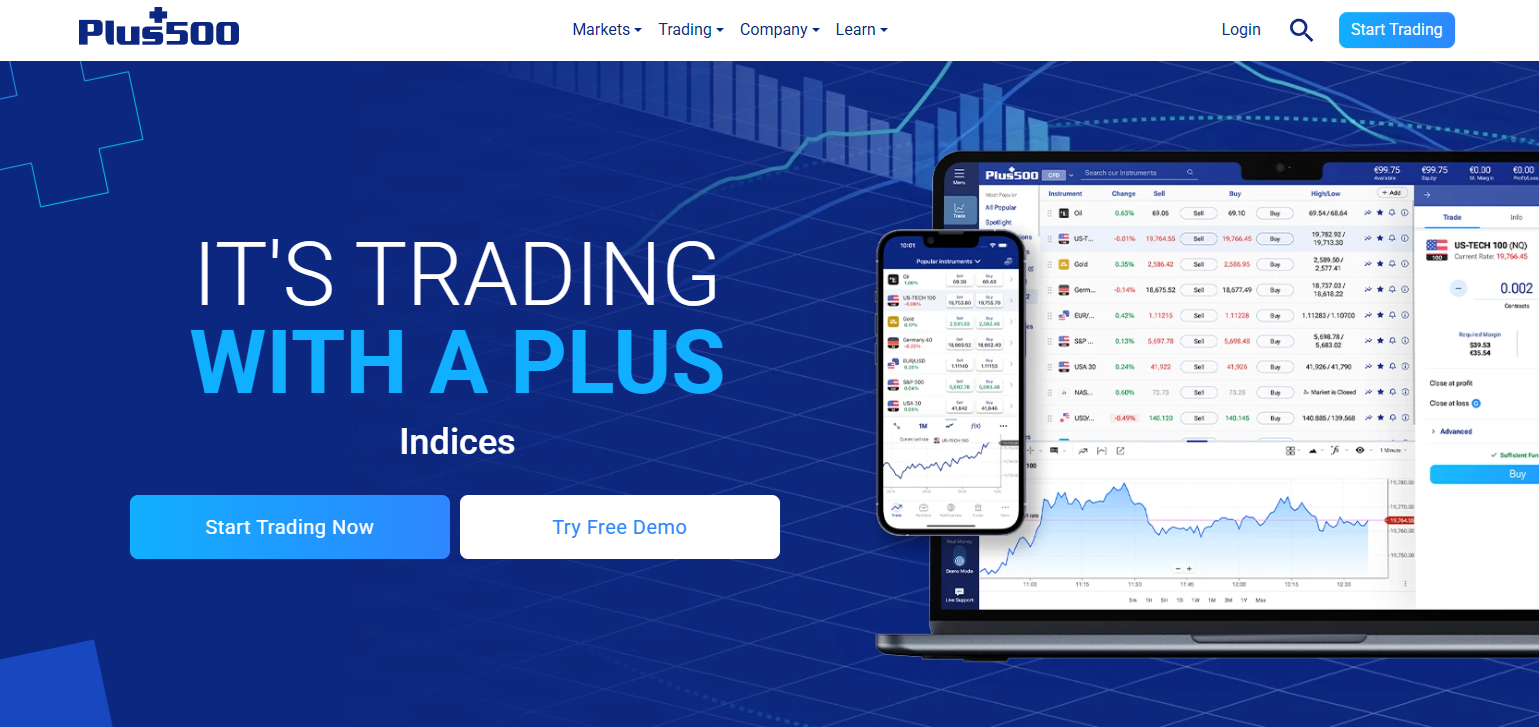In the grand theatre of global finance, Forex trading plays a starring role, with a daily turnover exceeding $6.6 trillion. Integral to this vast ecosystem are Forex brokers, serving as pivotal bridges between individual traders and the markets. The choice of a dependable broker can significantly influence a trader's trajectory.
Regulatory bodies such as the Financial Conduct Authority (FCA) lend credibility to brokers, thus adding an extra layer of security for traders. In this comprehensive guide, we delve into the world of FCA-regulated Forex brokers, the rigorous application process, the regulatory framework, potential scams, and a selection of top-rated FCA-regulated brokers.
History of FCA Forex Regulator
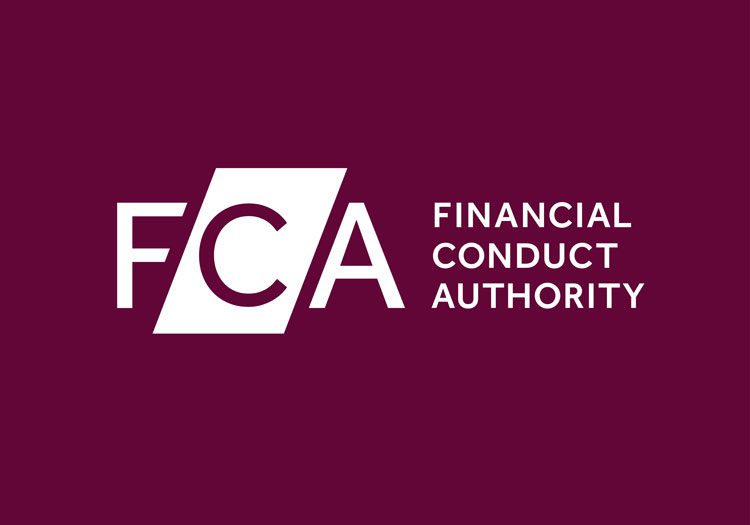
Birthed in 2013, the UK's Financial Conduct Authority (FCA) replaced its predecessor, the Financial Services Authority (FSA), in a bid to ensure higher standards of conduct in the financial services industry. Tasked with regulating over 59,000 financial services firms and markets, the FCA shoulders a colossal responsibility to maintain transparency, competitiveness, and fair treatment for consumers in the UK's financial marketplace.
Why Forex Brokers Choose FCA
Brokers choose FCA regulation for numerous reasons. Firstly, being regulated by the FCA significantly boosts a broker's credibility, given the FCA's stringent ethical and professional standards. Traders are naturally more inclined to trust a broker backed by a reputable regulatory body.
Secondly, FCA's rules provide a safety net for brokers and investors. The FCA mandates all brokers to maintain a certain level of net capital and to segregate client funds from company funds, which safeguards clients' investments from potential company-related risks.
Thirdly, in the event of a dispute, the FCA functions as a competent authority to intervene and resolve issues. This reassures traders that they can seek redress if they feel wronged.
Lastly, the FCA extends the Financial Services Compensation Scheme (FSCS), which can compensate clients up to £85,000 if a broker becomes insolvent. This significant feature lends an additional layer of security, motivating brokers to opt for FCA regulation.
Application Process for Brokers
The FCA's stringent application process ensures that only competent brokers receive regulation:
- The broker must complete a detailed application form, showcasing its readiness to adhere to FCA's regulations.
- Necessary documents, such as a comprehensive business plan, risk assessment procedures, and proof of capital adequacy, must be submitted.
- The firm must pass the ‘Fit and Proper Test' that ascertains the competence and integrity of its management and key personnel.
- The broker must agree to adhere to FCA's ‘Principles for Business,' which dictate a fair, transparent, and professional conduct.
- Regular audits and submission of annual financial reports to the FCA are required to maintain transparency and prove continued compliance.
FCA Regulations on FX Brokers
The FCA's regulatory framework revolves around several key aspects:
- Capital Adequacy: Brokers must maintain a minimum of £730,000 as operating capital to demonstrate financial stability.
- Client Fund Segregation: To safeguard client funds, brokers must keep them separate from the company's money.
- Reporting: Brokers are required to submit periodic financial reports to the FCA, ensuring transparency and ongoing compliance.
- Fair Treatment: FCA's guidelines mandate fair treatment of clients, discouraging any manipulative practices or misuse of client information.
- Dispute Resolution: FCA-regulated brokers must offer the Financial Ombudsman Service for dispute resolution, ensuring clients have a recourse in case of grievances.
Scams Associated with FCA Regulated Brokers
While FCA regulation significantly mitigates the risk of scams, there have been cases where even FCA-regulated brokers were implicated in fraudulent activities. These typically include platform manipulation, misleading advertisements, hidden fees, or providing unasked and deceptive investment advice to traders. Traders need to remain vigilant and report any suspicious activities to the FCA immediately.
Best FCA Regulated Brokers
#1. Exness
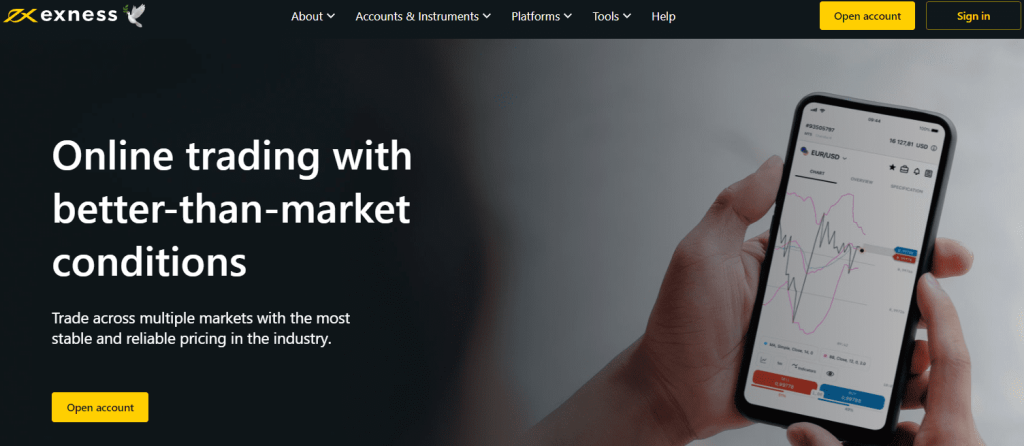
Exness is a globally recognized Forex broker that was established in 2008. The company's headquarters are based in Cyprus, and it operates under the regulatory oversight of several financial bodies, including the FCA in the UK and the Cyprus Securities and Exchange Commission (CySEC).
Exness provides an extensive range of trading services, including Forex, commodities, indices, and cryptocurrencies. It is renowned for its robust technological infrastructure, diverse trading account types, instant withdrawal services, and competitive spreads. Furthermore, Exness emphasizes transparency, providing audited financial reports accessible to the public.
Advantages and Disadvantages Trading with Exness
Commissions and Fees
Exness offers different account types, each with a distinct fee structure. Standard accounts are commission-free but have higher spreads, whereas Pro and Zero accounts have lower spreads but charge a commission per trade.
#2. Plus500
What is Plus500?
Plus500 is a prominent Contracts for Difference (CFD) provider, offering a diverse range of financial instruments, including commodities, forex, indices, and shares. The platform is renowned for its user-friendly interface, advanced charting tools, and real-time alerts, facilitating efficient and informed trading decisions. Operating under the stringent oversight of the Financial Conduct Authority (FCA) in the UK, Plus500 ensures a secure and transparent trading environment. This regulatory compliance, coupled with its comprehensive features, positions Plus500 as a preferred choice for traders seeking a reliable FCA-regulated broker.
Advantages and Disadvantages of Plus500
Commissions and Fees
Plus500 primarily generates revenue through the market spread, which is the difference between the buy and sell prices of an instrument, and does not impose commissions on trades. However, traders should be mindful of additional fees, such as overnight funding, which applies when holding a position after a specified time, and a currency conversion fee of up to 0.7% for trades on instruments denominated in a currency different from the account's base currency.
OPEN AN ACCOUNT NOW WITH PLUS500 AND GET YOUR WELCOME BONUS
#3. FXOpen
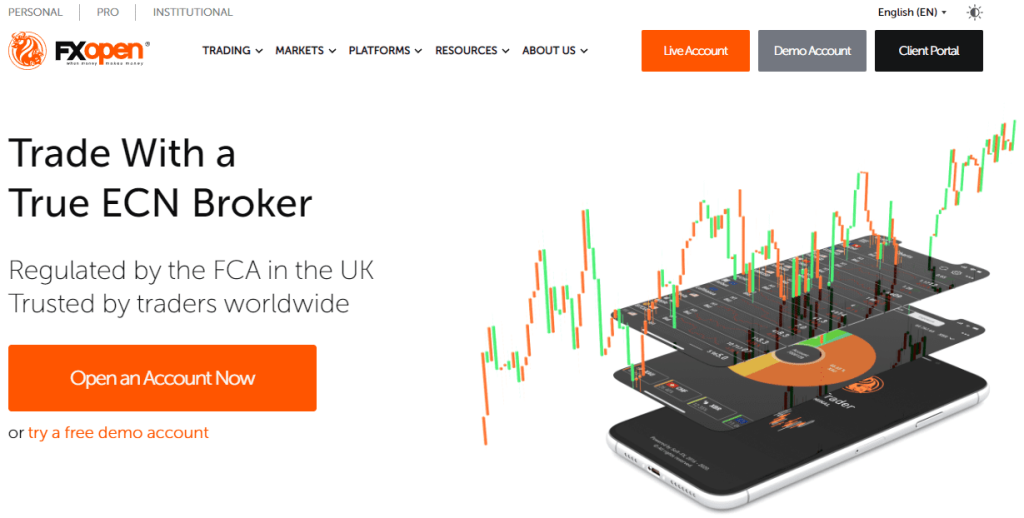
FXOpen is a leading Forex broker that began its journey in 2005. It was initially a training center before transitioning into a brokerage firm, armed with knowledge and insights into what traders need most. FXOpen operates under the regulatory purview of multiple authorities, including the FCA and the Australian Securities and Investments Commission (ASIC).
It is known for offering a vast range of trading instruments, an ECN trading environment, and cryptocurrency trading, a feature not commonly found among many brokers. Moreover, FXOpen provides its traders with access to the popular MetaTrader 4 and MetaTrader 5 platforms, which boast advanced trading tools and features.
Advantages and Disadvantages Trading with FXOpen
Commissions and Fees
FXOpen charges a commission on its ECN and Crypto accounts, while the STP and Micro accounts are commission-free but come with wider spreads.
#4. HYCM
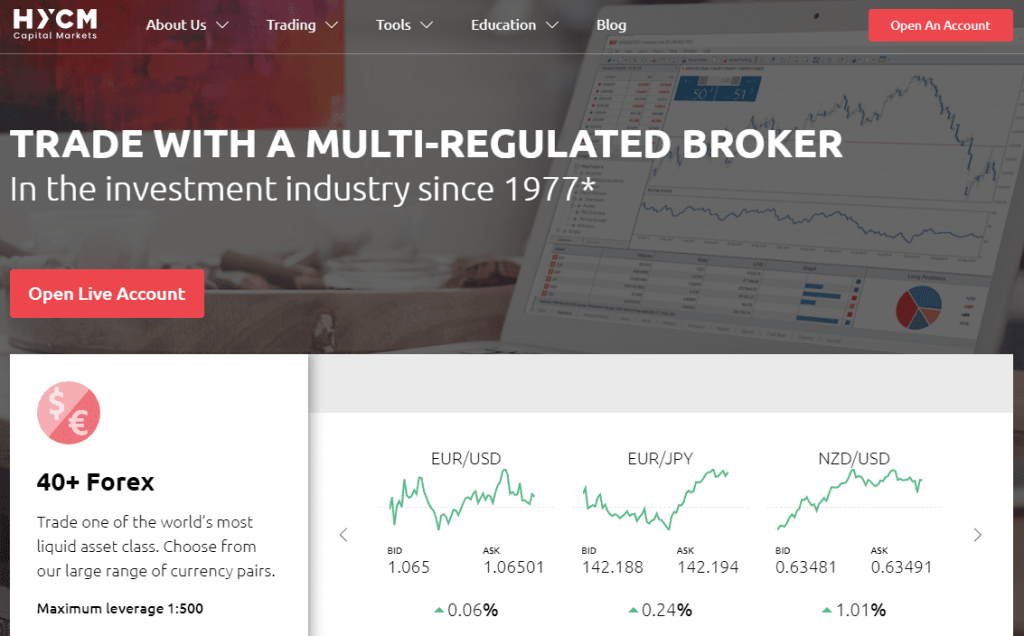
HYCM (Henyep Capital Markets) is an award-winning broker with over 40 years of experience in the financial markets. It operates under the regulations of multiple global authorities, including the FCA, the Cyprus Securities and Exchange Commission (CySEC), and the Dubai Financial Services Authority (DFSA).
HYCM offers a broad range of trading products across Forex, commodities, stocks, indices, and cryptocurrencies. It provides the MetaTrader 4 and MetaTrader 5 platforms, known for their robust features and user-friendly interfaces. The broker also offers comprehensive educational resources, making it a suitable choice for both new and seasoned traders.
Advantages and Disadvantages Trading with HYCM
Commissions and Fees
HYCM offers both spread-only and commission-based accounts. The fixed and classic accounts have no commission but wider spreads, while the Raw account has tighter spreads and charges a commission.
#5. Tickmill

Tickmill is a Forex and CFD broker that was established in 2014. It is regulated by several top-tier authorities, including the FCA, CySEC, and the Seychelles Financial Services Authority (FSA). Despite its relatively short operating history, Tickmill has earned a reputation for providing competitive spreads, high-speed order execution, and an extensive range of trading instruments.
It offers Forex, indices, commodities, and bond trading across the MetaTrader 4 platform. Along with these features, Tickmill also provides educational resources and trading tools, making it an appealing choice for traders of varying skill levels.
Advantages and Disadvantages Trading with Tickmill
Commissions and Fees
Tickmill's commission and fee structure varies across its account types. Pro and VIP accounts charge a commission but feature tighter spreads, while the Classic account is commission-free but comes with higher spreads.
Conclusion
Choosing an FCA-regulated Forex broker is a wise move, considering the FCA's rigorous standards that ensure fairness, transparency, and security for traders. However, it's crucial to consider a broker's specific features, fee structure, and reputation before committing your funds. The brokers mentioned above stand out in the crowd for their unique strengths, but traders should align their broker choice with their specific trading needs, goals, and risk tolerance.
FAQs
Is FCA regulation mandatory for Forex brokers in the UK?
Yes, any Forex broker operating in the UK must be regulated by the FCA to ensure the protection of traders' interests and market integrity.
What happens if an FCA-regulated broker goes bankrupt?
If an FCA-regulated broker goes bankrupt, clients can claim compensation up to £85,000 from the Financial Services Compensation Scheme (FSCS).
Does FCA regulation apply to non-UK residents?
FCA protection extends to both UK and non-UK residents, given that they trade with an FCA-regulated broker.
Can I trade cryptocurrencies with an FCA-regulated broker?
Yes, provided the broker offers cryptocurrency trading. For instance, FXOpen, an FCA-regulated broker, offers cryptocurrency trading.
How do I verify a broker's FCA regulation?
You can verify a broker's FCA regulation by checking its status on the Financial Services Register on the FCA's website.
